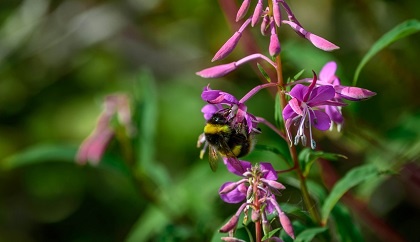
Pesticides that harm bees should be permanently banned in Scotland.
That's according to wildlife charities as an EU-wide temporary ban on neonicotinoids runs out this month.
Studies show the chemicals affect bee brains, and affect their ability to pollinate - which impacts badly on our ecosystem. Pollinators are worth at least £43m to Scotland's economy as an essential ecosystem service to farmers and fruit-growers, according to wildlife charity Buglife.
Head of Policy for the Scottish Wildlife Trust, Dr Maggie Keegan, said: "Since the EU ban came into force, restricting the use of certain neonicotinoids because of the high risk to bees, a huge amount of evidence has emerged which shows this was the right decision.
"This is why the Scottish Wildlife Trust is now asking the Scottish Government to show leadership and protect Scotland’s bees and other wildlife by permanently banning those neonicotinoids that do the most harm.
"These toxic chemicals not only harm bees, they also persist in the agricultural landscape and contaminate soils, potentially harming invertebrates such as earthworms. They are picked up by wildflowers, get into the watercourse and are linked to a decline in birds and butterflies in farmed systems.
"We now know that bumblebees can’t pollinate crops effectively when exposed to these pesticides, so it makes moral, ecological and economic sense to ban them. "
Scotland Director for Buglife, Craig MacAdam, said: "Buglife led a strong campaign that culminated in the EU suspension, an action we know the UK Government is opposed to.
"It is therefore essential that Scotland takes a lead in protecting the future of our pollinators and sets an example to Westminster – these bugs are our friends and without them agriculture as we know it would end."


 Man, 44, seriously injured in hospital after crash between Comrie and Rosyth
Man, 44, seriously injured in hospital after crash between Comrie and Rosyth
 John Swinney announces SNP leadership bid
John Swinney announces SNP leadership bid
 Closures on A92 from TONIGHT for roadworks
Closures on A92 from TONIGHT for roadworks
 13°C
13°C
 11°C
11°C
 17°C
17°C